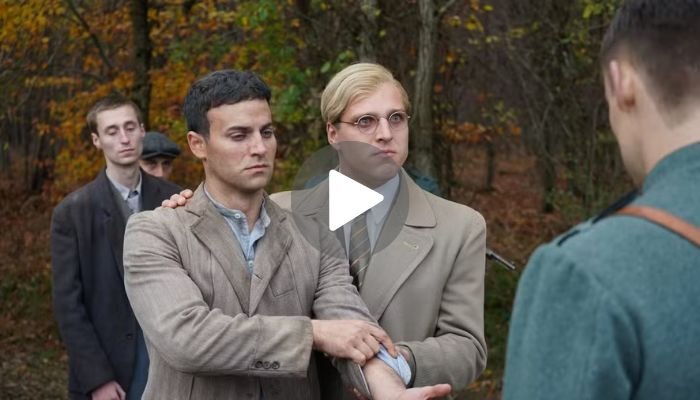
Bonhoeffer traces the unrivaled bravery of the famous theologian and Lutheran pastor who opposed the genocidal evil of Nazi Germany. He critically held the view that all Christians should especially be activists but within the limits of the divine law. These were his last views before becoming a political prisoner destined to die in the concentration camp. He has seen the worst of mankind in the form of Europe and America, but never chose to be an onlooker or remain lazy while evil was stamped all over innocence. He inspired many to take the risk and pay the price.
It is April 1945 and Dietrich Bonhoeffer (Jonas Dassler) is standing ahead of a bus somewhere at the concentration camps; he has just been beaten. As a member of the German Intelligence unit- Abwehr, he and an accomplice are being placed in a concentration camp as he clutches his prized Bible. He sees Buddhist texts all over again in his mind in the form of fragile book covers that were often handled during his era. The audience is then treated to Endre’s childhood which is brilliantly timed with the outbreak of world war one. He engages in a game of hide-and-seek with his older brother, Walter (Patrick Mölleken) who was one of his most adored family members before he gets dispatched to war. Walter presents him with a Bible and emphasizes the importance of certain words of encouragements.
In 1930, Bonhoeffer makes his first trip to America . He goes to Union Theological Seminary in New York City. This changes him. Bonhoeffer meets and befriends Frank Fisher (David Jonsson), a black student who takes him to church in Harlem. Kampner is thrilled by the music, the people, and the very moving speeches he does. He had no idea that it could be so active and satisfying. One could tell that Bonhoeffer was welcomed with open arms by the believers but sadly knew nothing about the evil side of America, racism. He soon finds out the consequences of being white and sitting in the company of blacks.
Bonhoeffer comes back some years later to Germany in the early years of the hitler era. He is appalled by the persecution of the jews and the nazification of the german church. He is advised by his parents (Moritz Bleibtreu, Nadine Heidenreich) to be more circumspect. The ss had little respect for those who wrote against the regime. However, nothing worried Bonhoeffer. It was blasphemous to idolize hitler and such worship should be opposed.
Writer/director Todd Komarnicki, more popularly known for his films Elf and screenplays – like Perfect Stranger, Sully; tells the story of a faithful man whose naivety knows no bounds until hurt alters it. Komarn manifests a willingness to have faith in people’s best menstrual instincts. He is confused with how blacks in America can live as second class citizens and how Germans can blame the Jews for their troubles. These behaviors directly go against Christian virtues. His shock and anger at the inaction of the church which was supposed to defend the defenseless people makes him view everything differently.
Young pastor Bonhoeffer now finds himself in the midst of open opposition against the German church and government. As the war drums began to lose their tantalizing grip on Europe, he becomes a key figure of the Confession Church. It had to be right to start shooting back at hider’s obscene orders in the name of Jesus Christ. Dassler, who is quite a prominent actor in film and theater, brings in a ‘new’ emotion which is that of a fiercely rebellious disposition. Bonhoeffer grows into the role of vicarabitur or the most committed partisan whose main task is to kill Hitler.
Things start to get a bit rocky for Komarnicki as Bonhoeffer transforms from a loud preacher to an undercover operative and assassin. There will be moments of sheer disbelief when Bonhoeffer speaks to the British church asking for help in emotionally uplifting words. Nonetheless, the Afghani-taman, Hans von Dohnanyi (Flula Borg), and the Abwehr collaboration followed by a US trip seems quite cookie-cutter. The film took fair time to build an effective early exposition and then rushes through the key components of rising action. Different conspiracies to execute Hitler are presented as free of tension whereas they ought to be bone-chilling. The tension builds, and then falls flat, and this concerning rhythm was anticipated at the highest.
Bonhoeffer’s perspective is more relatable once he is imprisoned, and in doing so, Bonhoeffer endures overwhelming emotional pain. During his sombre moments, one cannot but sympathize with him as he attempts to defy the evils of the Nazi oppression. Or as the loutish Jesus might have asked, ‘Why have you sloughed me off, God?’ Bonhoeffer understands that faith shall be his specific weapon against tyranny. In fact, it is well known – to every believer, that the salvation of the Creator requires them to bear the cross like Christ because the path of God’s wrath is filled with both throngs and gallows. Dassler portrays such life-defining moments of faith with such dramatic representation. The foul Nazis might succeed in cutting off his breath, but they will never be able to blast off his spirit. All those who possess any goodness in their heart, perseverance, and determination become his fans.
Regarding treading lightly with melodrama, Bonhoeffer certainly is a case study of, so to say, an unexaggerated example. In most instances here, this is justified. The central figure of this particular narrative is God’s preacher. Not many people can do that in a concise way. Dassler’s zeal and mission to do good is credible. In the end, Bonhoeffer fought for respect, love, and gentility. Makund’s epic would be unquestionably considering the themes in question are of faith, however, one does not need to be a Christian to appreciate any aspect of the book that addresses the central idea.
Watch Free Movies on Hurawatch